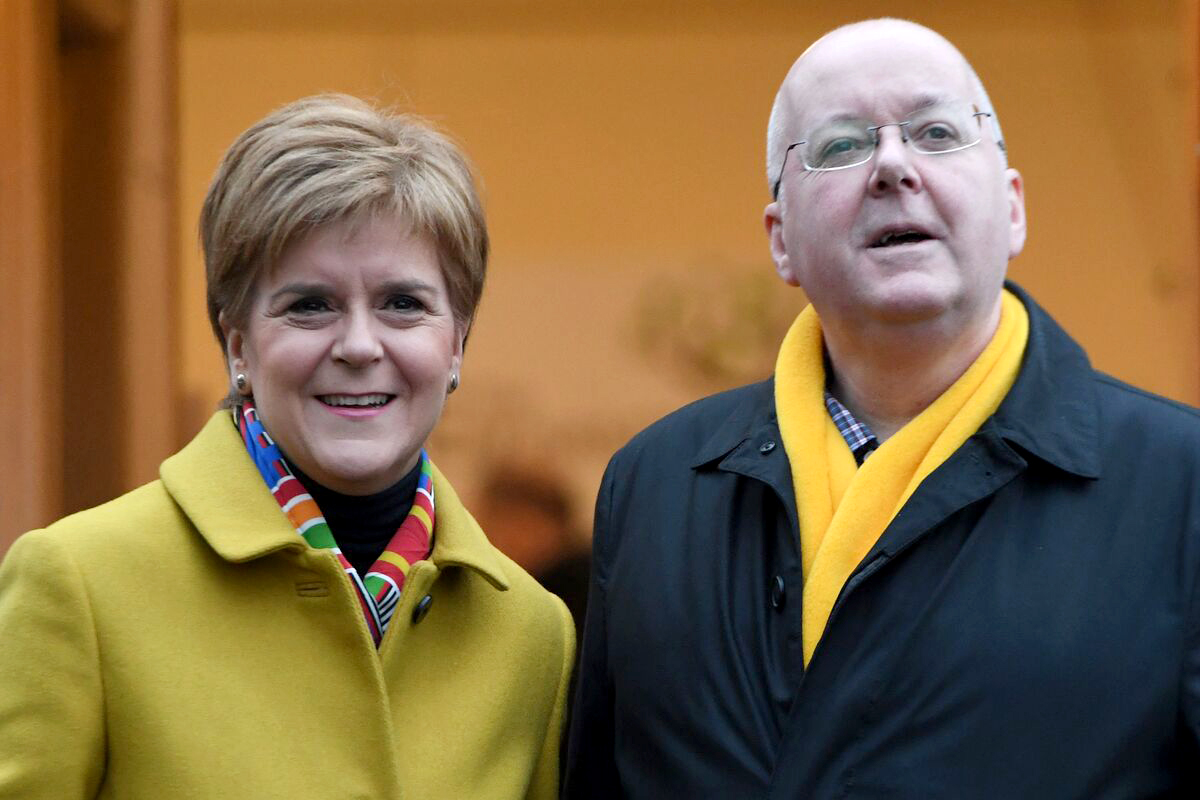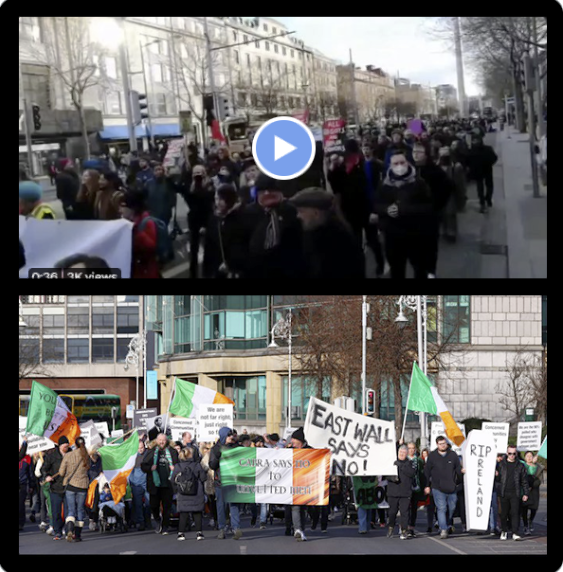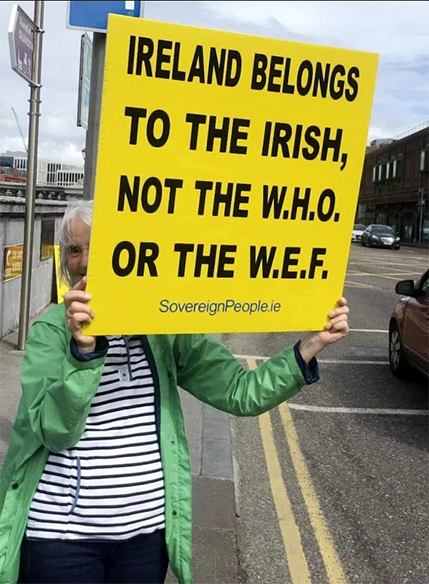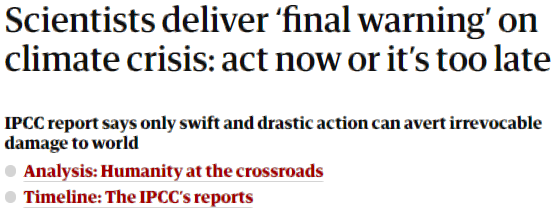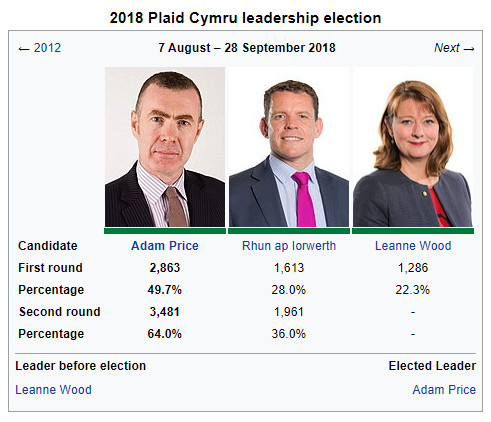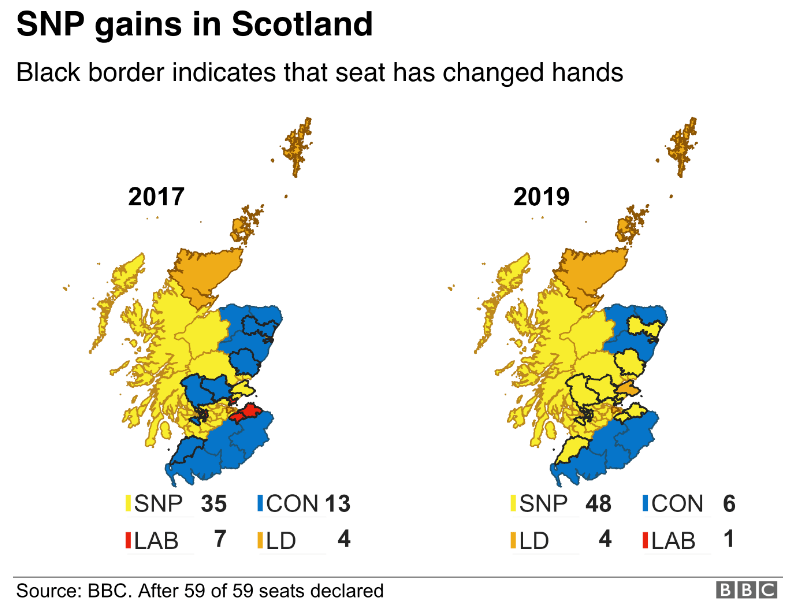![]() This piece has been prompted by information received from Scotland, which may clear up a lingering mystery, while also telling us more about the operations of those involved with Parabola Bute Energy.
This piece has been prompted by information received from Scotland, which may clear up a lingering mystery, while also telling us more about the operations of those involved with Parabola Bute Energy.
I use that name because I’m convinced that Bute Energy, which wants to build some 20 wind farms in Wales, plus other installations, also mile after mile of pylons, is little more than a venture into the renewables sector by property group Parabola.
I say that because the ultimate holding company for all Bute companies is Windward Global Ltd. This company is controlled by Oliver James Millican. He is the son of Peter John Millican, who runs Parabola.
The son worked for the father at Parabola, as did the other Bute principals (though some have since left Bute). They all ‘departed’ Parabola late in 2017 or early in 2018.
But to avoid confusion, I’ll stick to the name you’ve become familiar with.
◊
NEWS FROM THE NORTH
I’ve written a lot about ‘Bute Energy’, in its various incarnations, but always from a Welsh perspective. And despite consistently identifying it as a Scottish company, I’ve never really looked into what Bute’s owners might have got up to in Scotland.
So let’s put that right. Starting with a warehouse, a very big warehouse, over 122,000 sq ft; it’s to the east of Glasgow, not far off the M8, which runs to Edinburgh.
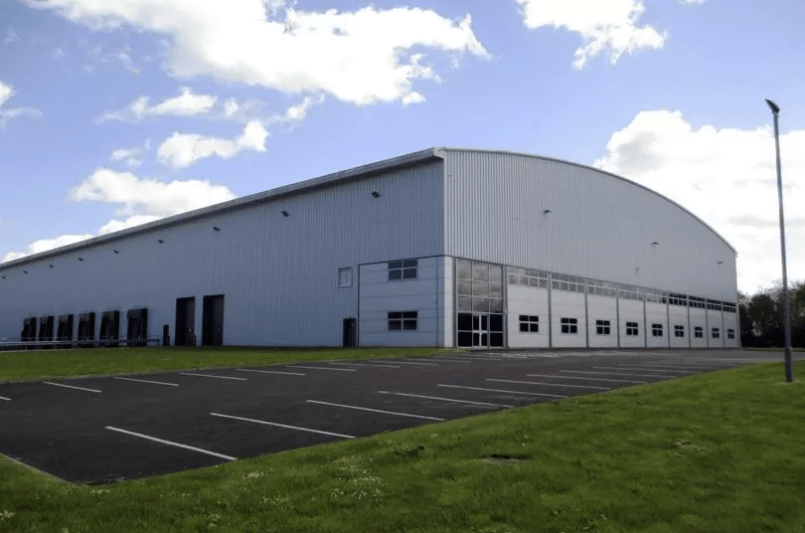
It was reported on October 2, 2018 that the Titan warehouse had been bought for £6.5M by Grayling Capital. This is Grayling Capital LLP, formed just over a year earlier.
If we turn to the Members of this LLP, we see the names of Oliver James Millican, Stuart Allan George, and Lawson Douglas Steele. These are the names we’ve become familiar with as they keep turning up as directors of the Bute companies in Wales.
At the bottom of the list we see David James Taylor, a Labour insider in Wales whose name has cropped up a few times in the Bute saga.
The warehouse had been used by Lidl, but the company decided to move out to a purpose-built warehouse of their own. So Grayling looked around for a buyer. They didn’t find one, but the Covid pandemic did provide a tenant, in the form of the Scottish government. Or rather, the Scottish NHS.
The lease runs to 31 January 2031, at £766,094 per annum. Which was a good bit of business for Grayling, but it got better. For in March 2021 the warehouse was sold for £14.326m to the Lothian Pension Fund. Ultimately owned by the City of Edinburgh Council.
Though I ask myself, why did Lothian Pension Fund pay £14.3m for a property it must have known sold for half that price just over two years earlier? Did the Auditor General get involved?
Grayling Capital LLP is now liquidated.
In the report I just linked to you’ll see the sale worded thus:
The Lothian Pension Fund has acquired a prime logistics warehouse at Eurocentral in North Lanarkshire from Windward Titan.
Windward Titan was a vehicle set up specifically for the warehouse deal in Scotland, and that explains why it hasn’t been mentioned on this blog. Though ‘Windward’ should certainly be familiar to regular readers. It crops up with a number of other companies.
Windward Titan is now dissolved.
The directors were of course Millican, Steele, and George. Control was exercised by Windward Enterprises Ltd, which is now – since St David’s Day this year – known as Windward Energy Ltd. Which is in turn owned by the company mentioned above as the ultimate holding company, Windward Global Ltd.
Here’s the warehouse disappearing from the Windward Titan balance sheet.
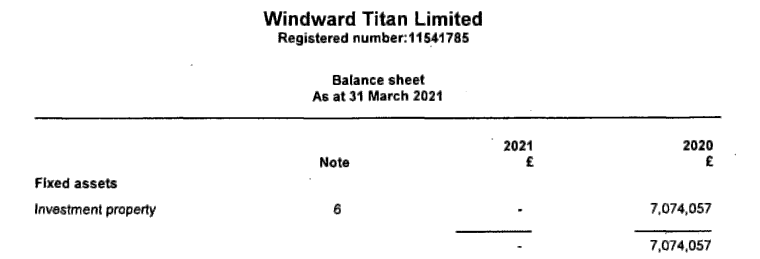
You’ll see that the warehouse was valued at just over £7 million. It sold for £14.3 million. And on top of that there’s the income of £766,000 a year from the Scottish NHS until 2031. Did that lease transfer to the new owner?
What’s more, a Scottish source tells me that the value of the warehouse was increased because as part of the lease the Scottish government agreed to undertake improvements costing £2.75m.
Bizarrely, this work meant that the warehouse could not be used at the height of the pandemic – which was the reason for taking out the lease in the first place!

One reason I find this story from Scotland so interesting is that it seems to presage what we’ve seen in Wales. More on this later.
Another reason is that those involved in the warehouse deal are now in Wales posing as planet savers, but they are first and foremost property speculators.
Never, ever, forget that.
◊
WHO FILLED THEIR BOOTS, AND HOW?
Windward Titan was started with a single £1 share and there was never any money in the kitty, just the value of the warehouse. The only cash money appeared at the end, from the parent company, to settle up with the liquidators.
So to follow the money we need to turn to Grayling Capital LLP.
A LLP is a Limited Liability Partnership, popular with solicitors, accountants, and other professionals working as a partnership. When used in a more commercial context it can disguise ‘opaque’ dealings.
What you see below is from the final page of Windward Titan’s financial statement for year ending 31.03.2020.
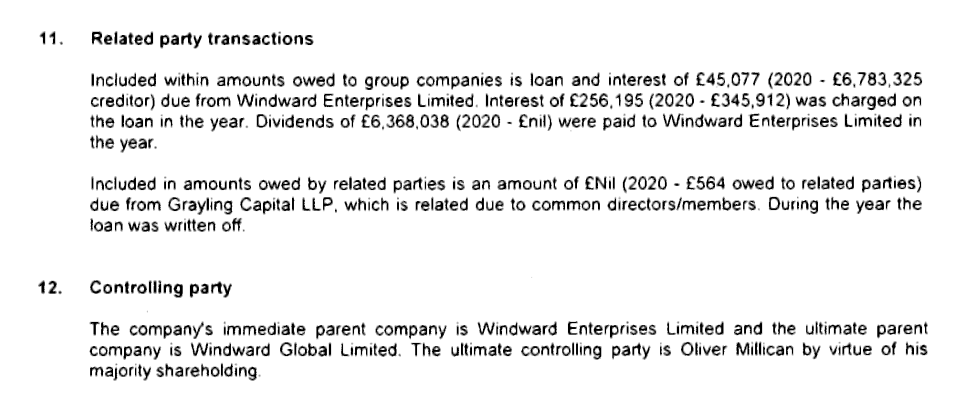
It tells that the Titan warehouse was bought by Windward Titan with a loan from parent company Windward Enterprises Ltd. And it also confirms that everything is ultimately owned by Windward Global Ltd and Oliver James Millican.
To return to Labour insider David James Taylor. Who’d been Spad to Peter Hain MP and Welsh first ministers Rhodri Morgan and Carwyn Jones. More specifically, to the money given to his company Moblake Ltd (originally Moblake Wind Ventures Ltd).
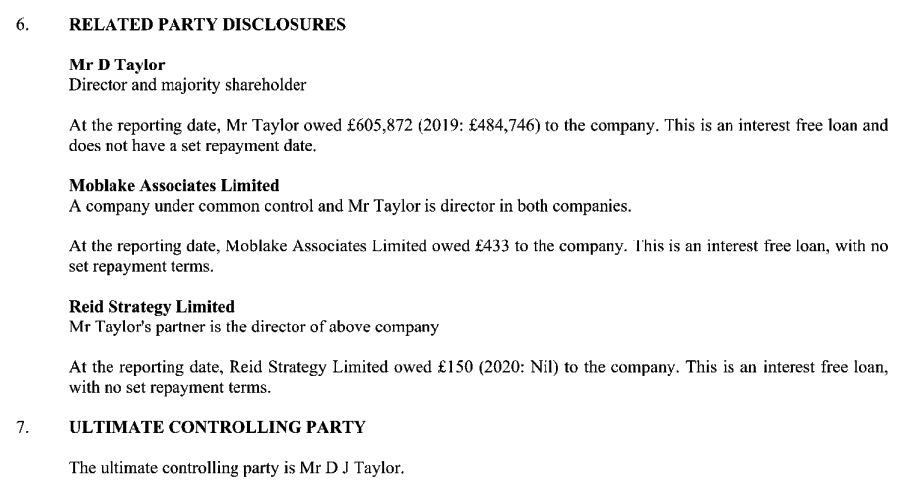
There were two possible sources for the ‘interest free loan’ of £605,872 Taylor made to himself. Both linked to Bute.
One was his shares in Windward Energy Ltd (formerly Windward Enterprises Ltd), but he held these shares until July 22, 2022. Whereas the mysterious £600,000+ had been and gone from Moblake at least a year earlier.
The answer would seem to be Taylor being a Member of Grayling Capital LLP. He ceased being a Member September 13, 2021, which ties in with the sale of the Titan warehouse in March of that year to the Lothian Pension Fund.
The question then becomes . . . why was Taylor, living either in Wales or London, involved with a Scottish company doing business in Scotland?
I think the answer may lie in the timing. Taylor joined Grayling Capital in September 2019, a year after the Bute boys seem to have found their way to Wales. They hired him to open doors in Corruption Bay and elsewhere.
So let’s look at what happened. And how I think it was done.
◊
BUTE COMES TO WALES
Now we’re going to look at how a clearly Scottish company manoeuvred itself into such a dominant position in Wales. But it could only have been done with the help of the Labour party.
On this blog, I first mentioned Bute Energy in November 2018, in Corruption in the wind?. But only tangentially. For I was really writing about a guy named Radford, who wanted to build three wind farms; two in Powys, the other in Pembrokeshire.
One of his projects, Hendy, near Llandrindod, was turned down by a planning inspector, but that decision was surprisingly overturned by Lesley Griffiths, who was at the time Energy, Planning and Rural Affairs Secretary in Corruption Bay.
To do that was strange enough. But it stank even more when it became clear that Griffiths did it just in time for the developer to erect a single turbine (never connected to the grid), in order to meet the Ofgem payment deadline on January 31, 2019.
Those involved even seemed to know about Griffiths’ decision in advance, to the extent of jumping the gun.
Here’s a recent update on Hendy from the CPRW.
Why did Lesley Griffiths give permission for a wind farm that was never going to be built? The answer is a 10-letter word beginning with ‘c’.
As I say, the guy involved was Steven John Radford, of Hendy Wind Farm Ltd. But he was only fronting for a big company called U+I.
The reason Bute got a mention was, and here I quote from that November 2018 piece:
In September Radford branched out again with Bute Energy Ltd, joining six days after its two founding directors.
Those two directors were Millican and Steele, who we’ve already met. Radford may have been their introduction to Wales. (Bute Energy Ltd was re-named RSCO 3750 Ltd in March 2020.)
Or maybe the key lies with whoever introduced them to each other. So let’s fit a few things into that time-frame.
Radford was already planning wind farms, and lobbying for him was Invicta Public Affairs of Newcastle. Invicta’s representative in Wales since October 2016 had been Labour Spad Anna McMorrin, now MP for Cardiff North.
The Bute Boys linked up with Radford, and Taylor might have taken over McMorrin’s role providing a link between developers and Labour party. A different Scottish source told me last year that Taylor has now been replaced by Sophie Howe, the former Future Generations Commissioner.
Here’s a table I drew up of some essential facts, with links. You might find it useful.
Among those who get a mention in the table are the four below. Vaughan is a former Labour MEP, and Uden is the husband of Labour MS Jenny Rathbone. For some reason you won’t find the panel below on the Bute website any longer.

And even though McMorrin never seemed to work for Bute before becoming an MP in June 2017, she nevertheless declared £3,000 received from Bute earlier this year.
Throughout this story I’ve been struck by how often Newcastle crops up. It’s the city where Parabola began life. ‘Bute’ companies have used Newcastle addresses. And Invicta, the lobbyist we encountered with Anna McMorrin, is also based there.
And there are a number of Parabola outfits using a Newcastle address.

But Invicta also has an office in Edinburgh, the city where we usually find Millican Jr, Steele, and George.
Something else worth remembering is that Lesley Griffiths and David Taylor know each other. They’re from the same area, here’s a photo of Taylor canvassing for Griffiths. Both had been involved in the Carl Sargeant tragedy.
What we looked at earlier in Scotland seems to be repeated to some degree with what we’ve seen in Wales.
On the one hand, we saw Millican and his mates do a lucrative deal with the Scottish Government. Here, Bute Energy has been adopted by the so-called ‘Welsh Government’.
In Scotland, a local government pension fund stepped in to buy Titan Warehouse for perhaps double what it was worth. Here there’s been a big investment from the Wales Pension Partnership. With some councils unhappy with the decision.
Is this all coincidence?
◊
WHAT NEXT?
Something worth remembering about Bute is that for all the companies, and all the wind farm projects, Bute has never erected a single bloody turbine. Perhaps because those involved are property speculators.
Which is why some people – and I’ve been one of them – think that Bute is not here to actually build wind farms. Maybe they’re just here to get exclusivity agreements with landowners and planning permissions.
Then sell up, making massive profits, without having done much other than smooch Labour politicians and sponsor Cwmscwt Annual Ferret Show.
But because there are now so many wind farm projects planned in Wales it can only be a matter of time before we see developers fighting turf wars. Maybe it’s started.
Take the case of Foel Fach and Orddu, just north of Bala.
Foel Fach Wind Farm Ltd, the company, was set up May 31, 2022. Head honcho is David Charles Murray. Orddu is a Bute project, the company formed a year later.
Murray got a mention on this blog back in October 2020 in, ‘Poor Wales: magnet for property spivs, fraudsters, and enviroshysters‘. I mentioned him due to his connection with the project between Port Talbot and Maesteg known as Y Bryn.
But Murray has been involved with many wind farm projects, and his main vehicle seems to be Coriolis Energy Ltd. It has a very basic website, and here’s the Companies House filing. Coriolis Energy is owned by Coriolis Energy Developments LLP. But again, that’s David Charles Murray.
Y Bryn Wind Farm Ltd shares a Berkshire address with Coriolis.
When we look at who’s behind Foel Fach, we see again Coriolis Energy Developments LLP and David Charles Murray.
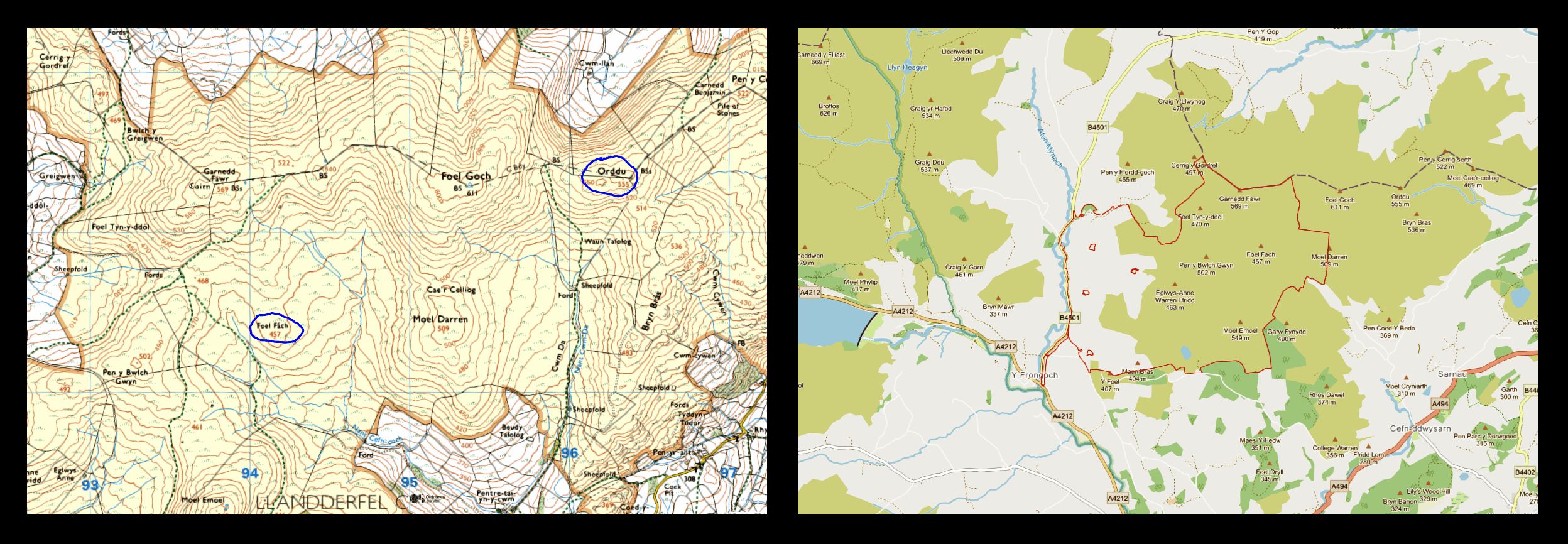
The map on the left shows the relative positions of the Foel Fach and Orddu summits. The map on the right gives the outline of the Foel Fach wind farm.
But this is where it gets a bit messy.
For a start, I can’t find a map for Orddu, so where will it end and Foel Fach begin? Are they contiguous? Do they overlap? Or are they two names for what will be one big site?
We’ve always been told there must be a ‘buffer zone’ between wind farms and National Parks. But Foel Fach runs right up to the Eryri boundary on the B4501. Who allowed this?
Incidentally, the ‘lake’ to the left on that map is the Tryweryn reservoir covering Capel Celyn. And Foel Fach wind farm will also overlook Frongoch, where Irish prisoners were interned after 1916.
And finally . . . I believe David Charles Murray of Coriolis is Scottish. Many of his other projects have been in Scotland. So are he and the Bute boys acquainted?
Wind farm developments in Wales are out of control, it’s a free-for-all. Planning permission guaranteed; no matter how ugly, inappropriate, or damaging the project. Wales already has too many wind farms (and too many pylons), we don’t need any more.
And because it appears we’re in this mess due to questionable links between wind farm developers and the Labour party, a thorough and impartial examination of such links is surely the best way to proceed.
Being the transparent and co-operative organisation it is, and with nothing to hide, I’m sure the Labour party will agree.
♦ end ♦
© Royston Jones 2024

